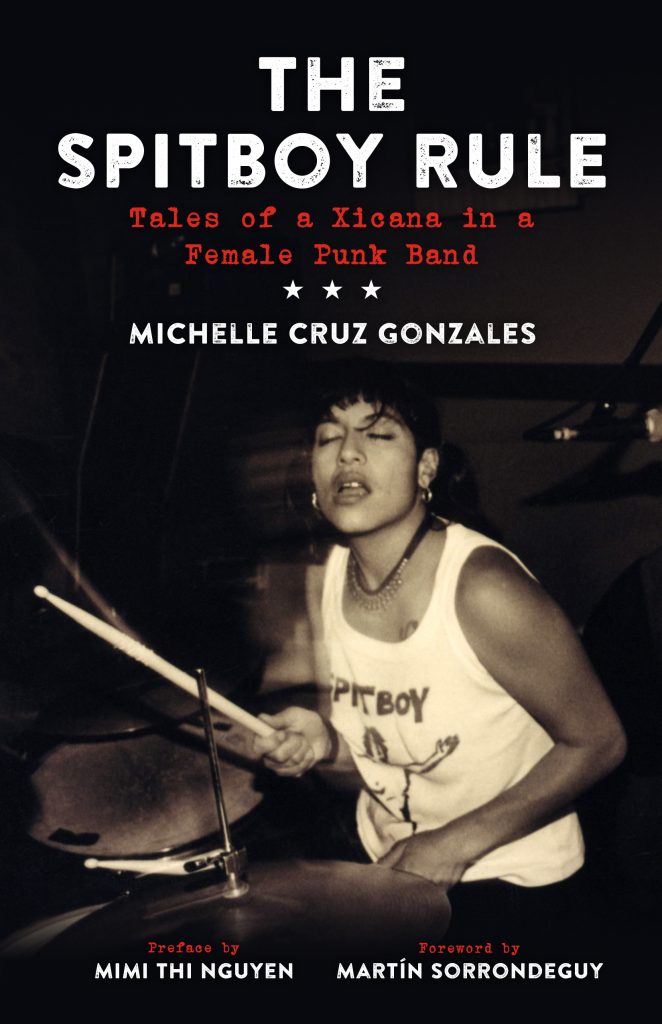by Nina Melissa Bautista
The Establishment
June 30th, 2016
Spitboy, an all-female punk/hardcore band active in the first half of the 1990s, were far more groundbreaking than their short run as a band would seem to indicate. Emerging before the advent of the broader Riot Grrrl movement that swept through the underground punk scene (and broke into the wider culture) in the ’90s, Spitboy were political by their very existence, and their lyrics of female empowerment (and their insistence on distributing those lyrics on print sheets at concerts) further cemented them as feminist punk icons in the underground music scene of their time.
Michelle Cruz Gonzalez, drummer for Spitboy (and a couple other bands–Bitch Fight and Instant Girl), has penned an insightful and entertaining new memoir about her time in Spitboy. The Spitboy Rule: Tales of a Xicana in a Female Punk Band (PM Press, 2016) tells of her upbringing in a small town in California, the formation of her first band as a teenager, and of course her time in Spitboy.
As a Mexican American in a predominantly white town, Gonzalez knew from a very early age what it meant to not fit in, to look different from the people around her, to be political by her very presence. This didn’t change as much as one would hope when she entered the punk scene. Even though punk was a movement of outsiders, it was still almost exclusively white and male when Gonzalez and her Spitboy sisters entered the fray around 1990. They had enough to push against as a band of women in a very male scene, but for Gonzalez, the only band member of color, this was doubly felt. While not the sole focus for Gonzalez in this book (or at the time of the events), the subtle racism she experienced, mostly of the sort that sought to erase her racial identity rather than mock or vilify it, is addressed throughout with honesty and insight, as is sexism the band dealt with.
“If not for being raised by a strong woman whose influences on me, negative and positive, were profound, I could have rebelled against subculture movements. But as a Mexican American, a Xicana in a hick town, I was never allowed to forget that I didn’t fit in, that I muddied their waters.
I would show them.” – page 3
Spitboy is sometimes lumped in with the Riot Grrrl movement, but they preceded and really sat outside that trend at the time. This was partially due to a perceived rift with that scene, though Gonzalez clarifies in The Spitboy Rule this was never about any actual animosity between Spitboy and the bands associated with Riot Grrrl. Gonzalez explains how this started. At a show in Washington, D.C., just as Spitboy’s set was beginning, Gonzalez took the mic and made the announcement that the band didn’t expect men to stand in the back of the room (a common request from Riot Grrrl bands at the time, to allow their female fans the best and safest experience they could have at their shows), and concluded by saying, “We’re not a Riot Grrrl band.” The room went silent, and though Gonzalez and her bandmates had no enmity with the movement led by bands like Bikini Kill, the myth began to spread from that show that they did.
“‘ah, quit your bitching and play some music.’ It was a male voice, of course, and it came from the cowardly back corner of the long, dark, narrow room. … I waited, sticks poised in the air, ready to count the song off because sometimes the song alone was enough of an answer. But Karin had thought fast.
‘Hey, you know what you need to do?’ she said into the microphone. ‘You need to go to the library and read a fucking book.’” – page 43
The Spitboy Rule is a quick read, and carries something of the do-it-yourself feel of the zines that mushroomed in popularity during the female punk heyday of the ’90s and helped to spread news and affection for that scene through an underground network of zinesters. Plenty of pictures are included, and the book’s conversational, hang-out tone makes these stories feel like they’re being told between songs at a show, or in the tour van right after. If you love punk music, or just want to read more about the experiences of a Xicana woman in a historically white male scene, check this book out.
The Spitboy Rule is available now at GPL.







